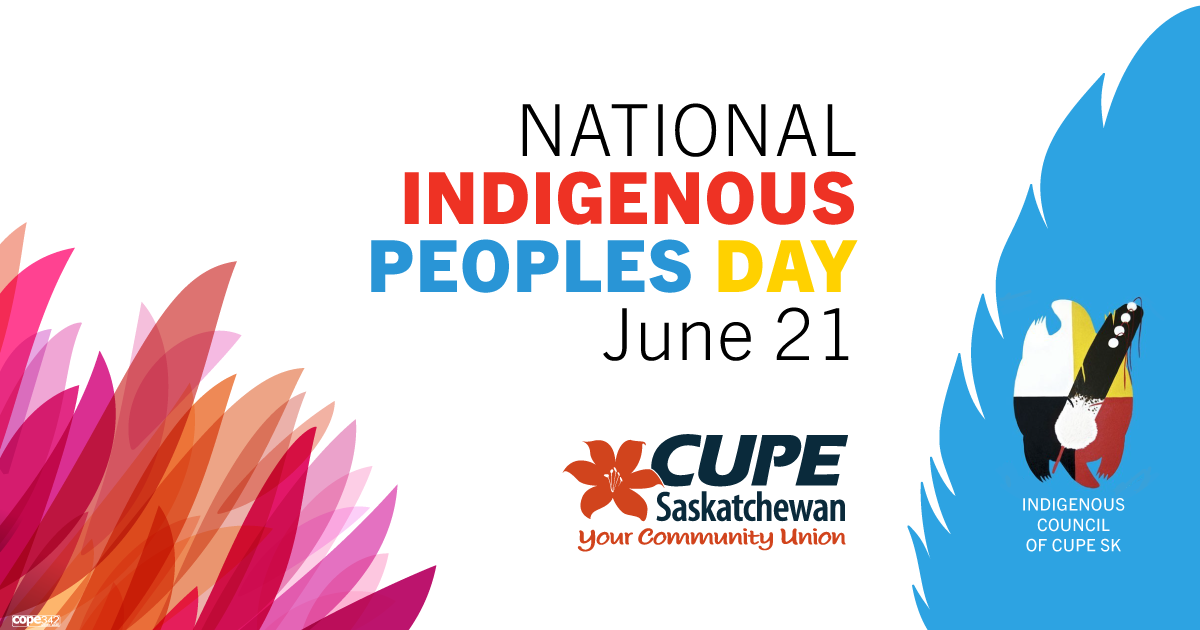National Indigenous Peoples’ Day on June 21 is an annual opportunity to honour and celebrate the diverse cultures, linguistic diversity, history and contributions of First Nations, Métis and Inuit peoples. It is also a time to reflect on the ongoing harms of colonialism and the need for greater action for truth, reconciliation and justice. As Saskatchewan’s largest union and Canada’s largest union, CUPE stands in solidarity with Indigenous nations, communities and organizations and is committed to continuing to work towards reconciliation, justice and to respect our ongoing treaty relationships.
Water Is Life
CUPE’s Water Is Life campaign raises awareness about the ongoing struggles and impacts of not having access to safe drinking water for Indigenous peoples in Canada. CUPE has long recognized that water is a basic human right for all people and our union is committed to taking action towards truth and reconciliation.
For National Indigenous Peoples Day 2023, CUPE has launched a new Water Is Life fact sheet, looking at how environmental racism and environmental disasters impact Indigenous people, and their access to safe drinking water in Canada. The fact sheet also highlights the vital community organizing work that different Indigenous communities have engaged in to prevent environmentally racist policies and projects, and to restore their communities following environmental disaster.
Check out our first fact sheet highlighting how Indigenous communities are still living without clean drinking water, as well as the stories that members of CUPE’s National Indigenous Council share in four Water Is Life videos, and our resource list to listen, learn and act. CUPE’s Water Is Life campaign challenges environmental racism and supports Indigenous peoples as water stewards and protectors.
Reflections on the need for greater action
The painful legacy of violence through colonialism continues as we collectively mourn the ongoing recovery of Indigenous children buried on residential school grounds. CUPE Saskatchewan stands in united grief and solidarity with Indigenous nations and communities, Residential School Survivors and their families, and the families of children who never made it home. Every child matters. Many of the Indigenous members of CUPE are themselves either Residential School Survivors or the children and grandchildren of Survivors, and in many cases all three.
Cadmus Delorme, former Chief of Cowessess First Nation, delivered an important message to delegates at the CUPE Saskatchewan convention this year on the need for everyone to act on Truth and Reconciliation and the 94 calls to action. Read more and share the message with members: “You can’t have reconciliation without truth” Chief Cadmus Delorme tells CUPE Sask. Convention delegates
The 2022 Progress Report on the Murdered and Missing Indigenous Women and Girls and 2SLGBTQQIA+ People National Action Plan renews the call for more accountability and action needed from government to meet the Inquiry’s 231 Calls for Justice. More urgent action must be taken by the federal government, and all levels of governments, to end violence against Indigenous women, girls, and 2SLGBTQQIA+ people.
Our union is striving to take ongoing action for truth and reconciliation by educating CUPE members on the truthful legacy of the residential school system and the ongoing harm Canada’s assimilationist policies and laws have on Indigenous peoples. We also stand in solidarity in the calls for justice.
In 2021, The United Nations Declaration on the Rights of Indigenous Peoples (UNDRIP) Act became law in Canada. The original declaration was passed by the majority of member states of the United Nations on September 13, 2007, and thus serves as the principal international framework to build and rebuild relationships with Indigenous people in recognizing fundamental rights. Canada’s Truth and Reconciliation Commission, which issued its final report in June of 2015, frequently references the UNDRIP, making the declaration the most comprehensive standard to which reconciliation should occur. Canadian governments have been slow to abide by the declaration that underscores the basic fundamental principles of Indigenous Peoples’ rights including: Free Prior and Informed Consent, the Right to Participate in Decision Making, Self-Determination, Sovereignty, and the recognition of Treaties. Read more about the declaration and its importance here.
Let’s join in celebrating National Indigenous Peoples Day and calling for greater action for truth, reconciliation and justice!
Resources for CUPE Local Unions:
- Truth and reconciliation: CUPE taking action through collective bargaining is a resource that supports locals in working towards reconciliation by bargaining language supporting Indigenous workers into collective agreements.
- In 2019, CUPE released Walking the talk: A practical guide to reconciliation for CUPE locals. This guide provides CUPE members with key resources to better acknowledge and include Indigenous members in our union, and to help locals take concrete action towards reconciliation with Indigenous peoples.
Learn more:
- Read the Truth and Reconciliation Commission Final Report and consider how you can support the Calls to Action
Learn more about CUPE Saskatchewan’s activism:
/n.m. cope342

